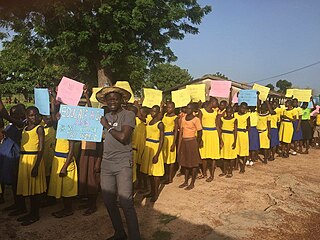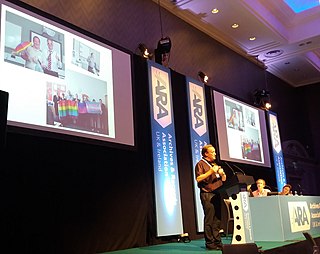Related Research Articles

Universal access to education is the ability of all people to have equal opportunity in education, regardless of their social class, race, gender, sexuality, ethnic background or physical and mental disabilities. The term is used both in college admission for the middle and lower classes, and in assistive technology for the disabled. Some critics feel that this practice in higher education, as opposed to a strict meritocracy, causes lower academic standards. In order to facilitate the access of education to all, countries have right to education.

A librarian is a person who works professionally in a library providing access to information, and sometimes social or technical programming, or instruction on information literacy to users.

The University of Alaska Anchorage (UAA) is a public university in Anchorage, Alaska. UAA also administers four community campuses spread across Southcentral Alaska: Kenai Peninsula College, Kodiak College, Matanuska–Susitna College, and Prince William Sound College. Between the community campuses and the main Anchorage campus, roughly 15,000 undergraduate, graduate, and professional students are currently enrolled at UAA. It is Alaska's largest institution of higher learning and the largest university in the University of Alaska System. The university is classified among "Master's Colleges & Universities: Larger Programs" with an additional classification for Community Engagement.
Ethnic studies, in the United States, is the interdisciplinary study of difference—chiefly race, ethnicity, and nation, but also sexuality, gender, and other such markings—and power, as expressed by the state, by civil society, and by individuals.
Native American studies is an interdisciplinary academic field that examines the history, culture, politics, issues, spirituality, sociology and contemporary experience of Native peoples in North America, or, taking a hemispheric approach, the Americas. Increasingly, debate has focused on the differences rather than the similarities between other Ethnic studies disciplines such as African American studies, Asian American Studies, and Latino/a Studies.
The Master of Library and Information Science (MLIS), also referred to as the Master of Library and Information Studies, is the master's degree that is required for most professional librarian positions in the United States. The MLIS is a relatively recent degree; an older and still common degree designation for librarians to acquire is the Master of Library Science (MLS), or Master of Science in Library Science (MSLS) degree. According to the American Library Association (ALA), "The master’s degree in library and information studies is frequently referred to as the MLS; however, ALA-accredited degrees have various names such as Master of Information Studies, Master of Arts, Master of Librarianship, Master of Library and Information Studies, or Master of Science. The degree name is determined by the program. The [ALA] Committee for Accreditation evaluates programs based on their adherence to the Standards for Accreditation of Master's Programs in Library and Information Studies, not based on the name of the degree."
REFORMA: The National Association to Promote Library & Information Services to Latinos and the Spanish Speaking, more commonly known as REFORMA, is an affiliate of the American Library Association formed in 1971 to promote library services to Latinos and the Spanish-speaking. It is registered in Washington, D.C. as a 501(c)(3) nonprofit organization.

Arnulfo Duenes Trejo was a writer and Professor of Library Science at the University of Arizona. He was a leader in the movement to increase library collections of Latino literature and Spanish-language materials in the United States. He was also instrumental in efforts to train more Latino and Spanish-speaking people as professional librarians.
Education for librarianship, including for paraprofessional library workers, varies around the world, and has changed over time. In recent decades, many institutions offering librarianship education have changed their names to reflect the shift from print media to electronic media, and to information contained outside of traditional libraries. Some call themselves schools of library and information science, or have dropped the word "library" altogether.

Transliteracy is "a fluidity of movement across a range of technologies, media and contexts". It is an ability to use diverse techniques to collaborate across different social groups.
The University of Arizona College of Medicine – Tucson, located in Tucson, Arizona, is one of three MD granting medical schools in the state of Arizona, affiliated with the University of Arizona. The University of Arizona College of Medicine – Phoenix was initially established as a branch campus in 2007, but became an independent medical school in 2012. The College of Medicine – Tucson campus is located at the University of Arizona Health Sciences (UAHS) center on the campus of the University of Arizona and is governed by the Arizona Board of Regents. Traditionally, the college accepted Arizona residents exclusively. However, beginning the 2009–2010 incoming class, the school changed its policy to allow for admission of "highly-qualified," non-residents.

In the United States, tribal colleges and universities (TCUs) are a category of higher education, minority-serving institutions defined in the Higher Education Act of 1965. Each qualifies for funding under the Tribally Controlled Colleges and Universities Assistance Act of 1978 or the Navajo Community College Act ; or is cited in section 532 of the Equity in Educational Land-Grant Status Act of 1994.
The American Indian Library Association (AILA) is an affiliate of the American Library Association (ALA), and is a membership action group that focuses on the library-related needs of Native Americans and Alaska Natives. The organization's members consist of both individuals and institutions that are interested in improving library services to Native American people in any type of library in the United States.
Joe G. N. "Skip" Garcia is an American pulmonary scientist, physician and academician.

Loriene Roy is an American scholar of Indigenous librarianship, professor and librarian from Texas. She was the first Native American president of the American Library Association when she was inaugurated in 2007.
The University of Arizona School of Information is a multidisciplinary academic department and professional school that is housed within the university's College of Social and Behavioral Sciences. The school focuses on the many aspects of information organization, management, or use and its impact on individuals and society. A combination of the School of Information Resources & Library Science (SIRLS) and the School of Information: Science, Technology, and Arts (SISTA), this new department plays host to faculty and students engaged in research and education on facets of the information sciences.

The field of library science seeks to provide a diverse working environment in libraries. Ways to change the status quo include diversifying the job field with regards to age, class, disabilities, ethnicity, gender identity, race, sex, and sexual orientation.
Elizabeth Yakel is an archivist, researcher, and educator in information science. Yakel is known for work advancing archival practice, the use of primary sources in archives education, studies of data reuse practices, and digital curation. Yakel is the senior associate dean for academic affairs and a professor at the University of Michigan School of Information, where she has been on the faculty since 2000. She is the former coordinator of the Preservation of Information specialization in the Master of Science in Information program and teaches in the Archives and Record Management area. She specializes in digital archives and digital preservation and has developed five such graduate level courses at UM, including "Economics of Sustainable Digital Information" and "Practical Engagement Workshop in Digital Preservation."
Elizabeth Martinez is a librarian whose career has focused on bringing diversity, multiculturalism and equality to public libraries and information policy. In 1966 she was the first Mexican American librarian to serve in the state of California. Martinez has served as a library administrator, professor, Executive Director of the American Library Association, and other roles throughout her career.
Cheryl Metoyer is an Eastern Band Cherokee researcher and professor of library and information science. Her research is focused on Indigenous systems of knowledge, especially in relation to American Indian and Alaskan tribal nations, as well as ethics and leadership in cultural communities. She holds the position of Associate Professor Emeritus and the Director of the Indigenous Information Research Group (IIRG) at the iSchool at the University of Washington.
References
- ↑ Berry III, J. (2004). Knowledge River. Library Journal, 129(7), 55.
- ↑ Hankins, R, Saunders M & Situ, P. (2003) Diversity initiatives vs. residency programs. College and Research Libraries News, 64(5), 308-310, 315.
- ↑ Jennifer, O'Neal; G, Lewis, David (2015). "Native American Archives Special Issue: Dedication". Journal of Western Archives. 6 (1). ISSN 2154-7149.
{{cite journal}}: CS1 maint: multiple names: authors list (link) - ↑ (2001). Library Program to Recruit Hispanics, American Indians. Black Issues in Higher Education, 18(14), 51
- ↑ Everett-Haynes, La Monica (2011, June 28). UA's Knowledge River Program Lands Federal Grant. UA News. Retrieved from uanews.org